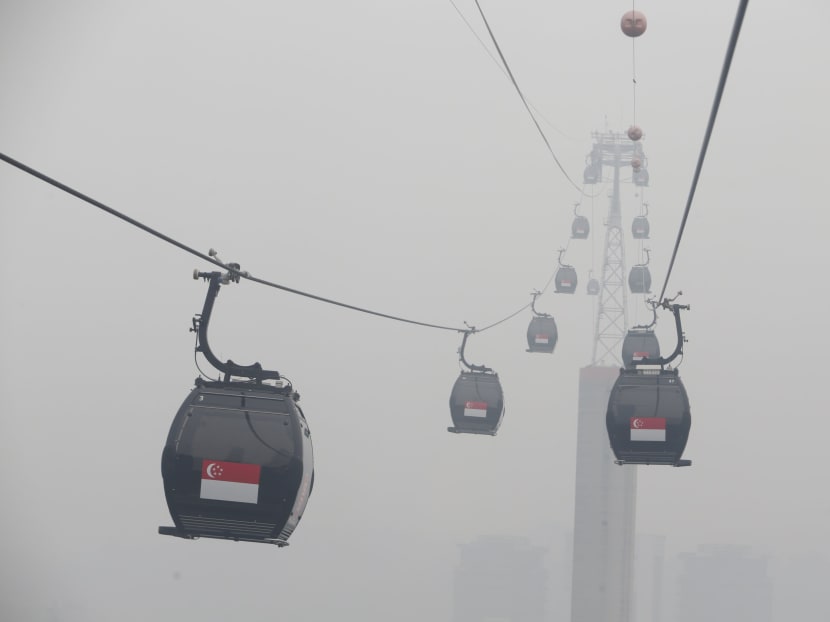How vitamins can protect you from the damaging effects of air pollution
HONG KONG — Taking the right vitamins before travelling to a city with serious air pollution could protect your DNA from heritable damage caused by breathing in fine particles, a new study suggests.

Cable cars moving towards the island resort of Sentosa are shrouded by haze in Singapore on Sept 29, 2015. Photo: Reuters
HONG KONG — Taking the right vitamins before travelling to a city with serious air pollution could protect your DNA from heritable damage caused by breathing in fine particles, a new study suggests.
An international research team led by Dr Jia Zhong, from the Mailman School of Public Health at Columbia University in New York, found that a combination of three B vitamins — folic acid, B6 and B12 — could strengthen the self-defence mechanism of genome molecules, which are prone to mutate when exposed to high levels of PM2.5 (respirable suspended particles with a diameter of 2.5 microns or less), and help healthy adults offset the inflammatory and other symptoms of short-term exposure, especially if they came from an area low in pollution.
“Ultimately, we aim to develop potential individualised intervention strategies that can be applied to mega cities such as Hong Kong and Beijing,” said Dr Zhong, who earned a master of science degree in biochemistry and molecular biology at the Chinese Academy of Sciences before completing her doctorate at Harvard University’s school of public health last year.
With the research at an early stage, the scientists were unable to recommend dosages before travel but they did recommend eating more B vitamin-rich foods than usual.
“Biologically, B vitamins in the diet are expected to have the same effect on the epigenome as pill-based supplements ... I would suggest maintaining a healthy, balanced diet with sufficient sources of B vitamins,” Dr Zhong said.
Leafy green vegetables and beans are rich in folic acid, B6 can be found in fish, beef liver and starchy vegetables, and B12 in fish, meat, eggs and milk.
However, Dr Zhong said, people constantly exposed to high levels of PM2.5, such as those living in heavily polluted cities, might benefit from taking supplements.
“B vitamin supplementation might be considered with a physician’s recommendation,” she said. “If not overdosing, B vitamins are usually considered safe for most people when taken by mouth.”
Unlike most previous studies, which were conducted on animals or cultured cells, Dr Zhong’s team studied 10 volunteers in an experiment at a laboratory in Toronto, Canada. They were all healthy non-smokers from a variety of ethnic backgrounds and were aged between 18 and 60.
It was the first test on living humans to suggest a remedy for genetic damage caused by smog, the researchers said in their paper, published in the latest issue of the journal PNAS.
The researchers captured polluted air from a busy street in downtown Toronto and then concentrated the PM2.5 level to more than 250 micrograms per cubic metre of air, which is the “hazardous level” according to the World Air Quality Index.
In the first stage of the experiment, the volunteers inhaled the concentrated smog for two hours before giving blood samples. For the second stage they were given B vitamin supplements for four weeks before going through the same process.
Well known symptoms of exposure to smog include chest pain, dizziness, headaches and heart disease, and the researchers cited a historical study that said high levels of air pollution were linked to a tenfold increase in death rates. Some recent studies also found PM2.5 could damage human brain cells and interfere with the way genes work, but the molecular mechanism remains poorly understood.
Dr Zhong and her colleagues confirmed that high levels of air pollution could overwhelm a gene’s adaptive capability, introducing errors in gene replication that could trigger unexpected mutations.
They observed such damage in the volunteers’ T helper cells, which play an important role in the human immune system.
The researchers found that taking B vitamin supplements for four weeks reduced the damage caused by exposure to high levels of PM2.5 by between 28 per cent and 76 per cent. That suggested the vitamin pills not only acted as a preventive, but were also able to repair some of the genetic damage caused by exposure to high levels of PM2.5.
More than 90 per cent of the world’s population live in places where the annual average PM2.5 level is worse than the 10mcg per cubic metre of air recommended by the World Health Organisation. The average in Beijing last year, according to the official Xinhua news agency, was 73mcg. At 2am on the first day of the Lunar New Year, January 28, it hit 647mcg, while China’s national standard is 35mcg.
Professor Cai Peng, who researches the biological effects of pollution at the Chinese Academy of Sciences’ Institute of Urban Environment in Xiamen, Fujian province, said the study could be improved by using a larger sample size.
“I don’t think we can dose a city or an entire country with vitamin B,” he said. “For that you would need much stronger evidence than the data from 10 people.”
Some previous research had also suggested that taking vitamin supplements, especially at an early age, could decrease the body’s ability to acquire or generate the necessary nutrition, and might lead to premature death.
Dr Cai said the war on smog could only be won by fighting pollution, “not taking pills”.
Dr Zhong agreed.
“I truly believe that emission control and regulation remains the backbone of environment-related disease prevention, while some individual-level prevention options might be considered if constantly exposed to severe air pollution,” she said.
Such options included avoiding outdoor activity, wearing masks capable of filtering out PM2.5, using air filters home and at work, and maintaining “a healthy balanced diet with sufficient sources of B vitamins and other nutrients”. SOUTH CHINA MORNING POST





